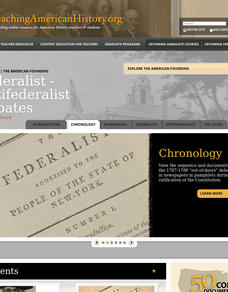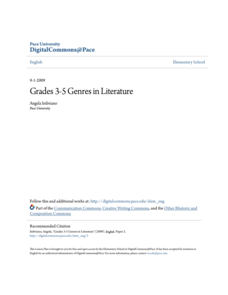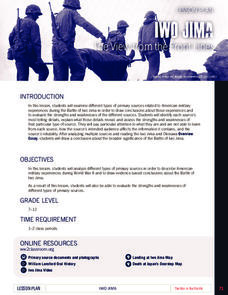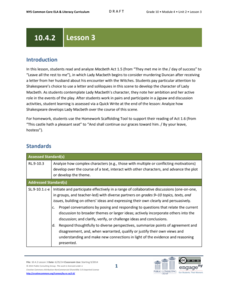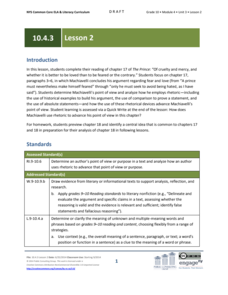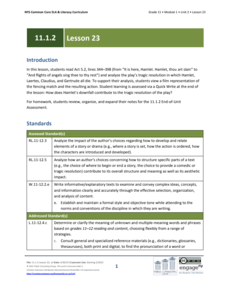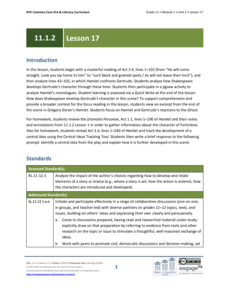Reading Through History
Tulsa Race Riots
How did the 1921 riots in Tulsa start? Pupils read information about the riots that occurred in Tulsa. Following the reading, they answer multiple-choice questions and guided reading questions to help them along the way.
iCivics
Mini-Lesson: Gerrymandering
Who determines the structure of voting districts? The concept of gerrymandering brings to light the ongoing issue of how those running for office gain votes. Hands-on activities enable scholars to analyze the re-drawing of voting...
iCivics
Mini-Lesson: Filibusters
How long can you speak without stopping? Scholars analyze the concept of a filibuster in the United States Senate using an installment of the Legislative Branch series of mini-lessons. They research recent filibuster attempts in the...
iCivics
Mini-Lesson: Presidential Succession
Who is in line for the presidency? Learners research the line of succession in the executive branch. They analyze the role the cabinet plays in a situation where the president and vice president are not able to serve. Along the way,...
iCivics
Mini Lesson: Supreme Court Opinions
The court of last resort. Historians research, using current cases and issues, the impact the Supreme Court of the United States has on how our nation operates. They analyze recent decisions made by the nine judges and determine how the...
iCivics
Mini-Lesson: Presidential Pardons
How do United States presidents give people second chances? Scholars research the concept of presidential forgiveness, or pardon. By completing an Executive Branch Mini-Lesson, class members get a better grasp of the power the executive...
Woodrow Wilson International Center For Scholars
The Fiscal Ship
Can young economists right the fiscal ship of the United States before it sinks? Learners use an interactive simulation to navigate the waters of the federal deficit in an effort to curb the federal deficit. They make active decisions of...
Council for Economic Education
Employment Data: Is the Economy Healthy?
Low unemployment is an indicator of a healthy economy—right? Current employment data and research leads scholars on a quest to find the true health of the economy. They analyze research on Payroll Employment Data and watch a short video...
PBS
The Last Generation
How does climate impact the town, city, or area where people live? Scholars research the concept of climate change as it pertains to the Marshall Islands. The opening lesson of a two-part series uses interactive online resources and...
Ashbrook Center at Ashland University
Ratification of the Constitution
How difficult was it to get everyone to agree on the contents of the Constitution? Historians analyze the task of the Founding Fathers in creating the United States Constitution. They research a directory of video clips, primary sources,...
Ashbrook Center at Ashland University
Federalist - Antifederalist Debates
Who should have the power—individual states or the federal government? Scholars research the arguments of the Federalists and Anti-Federalists during the formation of the United States Constitution. Online resources, including a vast...
Ashbrook Center at Ashland University
The Constitutional Convention
Imagine sitting down with representatives of your school to write a new student handbook. What arguments would ensue? How would compromises be made to finish the project? Scholars research the Constitutional Convention using a directory...
Serendip
Mitosis and Meiosis Card Sort
Cells divide by one of two processes, either mitosis or meiosis. Scholars sort cards into two sets, one representing each type of cell division. Then, they sequence the cards demonstrating an understanding of the movement of chromosomes.
Americans All
A Simulation: The Peopling of America
What was it like to pass through Ellis Island? Learners move through the immigration process of the early 1900s in a simulation activity. A comprehensive activity includes role-playing profiles and other manipulative items such as...
National WWII Museum
Picturing the War in the Pacific: A Visual Time Line
The Pacific theater was critical to the Allied victory of World War II. Learners deconstruct the sequence of events around the conflict using stunning photographs. After they finish, pupils consider what additional dates and images they...
Pace University
Genres in Literature
Enthusiastic readers take part in a book club unit that focuses on genre, particularly historical fiction, fantasy, and adventure. Over the course of 10 days, groups read a variety of stories and choose leveled activities from a learning...
National WWII Museum
Iwo Jima: The View from the Front Lines
Iwo Jima was the site of some of the most grim fighting in World War II. Learners consider this fact while examining primary sources, including letters home, from those on the front lines. After they complete the analysis, scholars then...
EngageNY
Grade 10 ELA Module 4: Unit 2, Lesson 3
How does Lady Macbeth's ambition help advance the plot of Shakespeare's Macbeth? Scholars explore the topic using discussion and a jigsaw activity. Next, they complete a quick write to analyze how Shakespeare develops Lady Macbeth's...
EngageNY
Grade 10 ELA Module 4: Unit 2, Lesson 19
A tragic play includes imperfect heroes, pity and fear, and a fatal flaw. Scholars analyze Shakespeare's Macbeth as an example of the tragedy genre. Pupils demonstrate understanding by completing a Quick Write discussing how Shakespeare...
National WWII Museum
Women and the War: Supporting Historical Interpretations
Rosie the Riveter may be an iconic image from World War II, but not all historians agree on how the conflict affected women in the workplace. Individuals evaluate the writings of well-known historians on the topic, and then decide: Was...
EngageNY
Grade 10 ELA Module 4: Unit 3, Lesson 2
How do rhetorical devices advance an author's point of view? Scholars consider this question as they continue exploring Machiavelli's The Prince. They work in small groups, annotating the text for evidence of rhetoric before engaging in...
EngageNY
Grade 11 ELA Module 1: Unit 2, Lesson 23
All's well that ends does not apply to Shakespeare's Hamlet. Scholars read Act 5.2 using the resource, discovering the play's tragic resolution. Pupils complete a Quick Write analyzing how Hamlet's downfall contributes to the play's...
EngageNY
Grade 11 ELA Module 1: Unit 2, Lesson 17
Why is Hamlet so upset with Gertrude? Using the resource, scholars read Act 3.4 of Hamlet, analyzing how Shakespeare develops Gertrude's character in the scene. Next, pupils participate in a jigsaw activity to discuss Hamlet's monologues.
EngageNY
Grade 11 ELA Module 1: Unit 3, Lesson 4
How have society's expectations influenced female writers? Pupils explore the topic by reading chapter three of Virginia Woolf's A Room of One's Own. Scholars complete a Quick Write to analyze how Judith Shakespeare's experiences...












